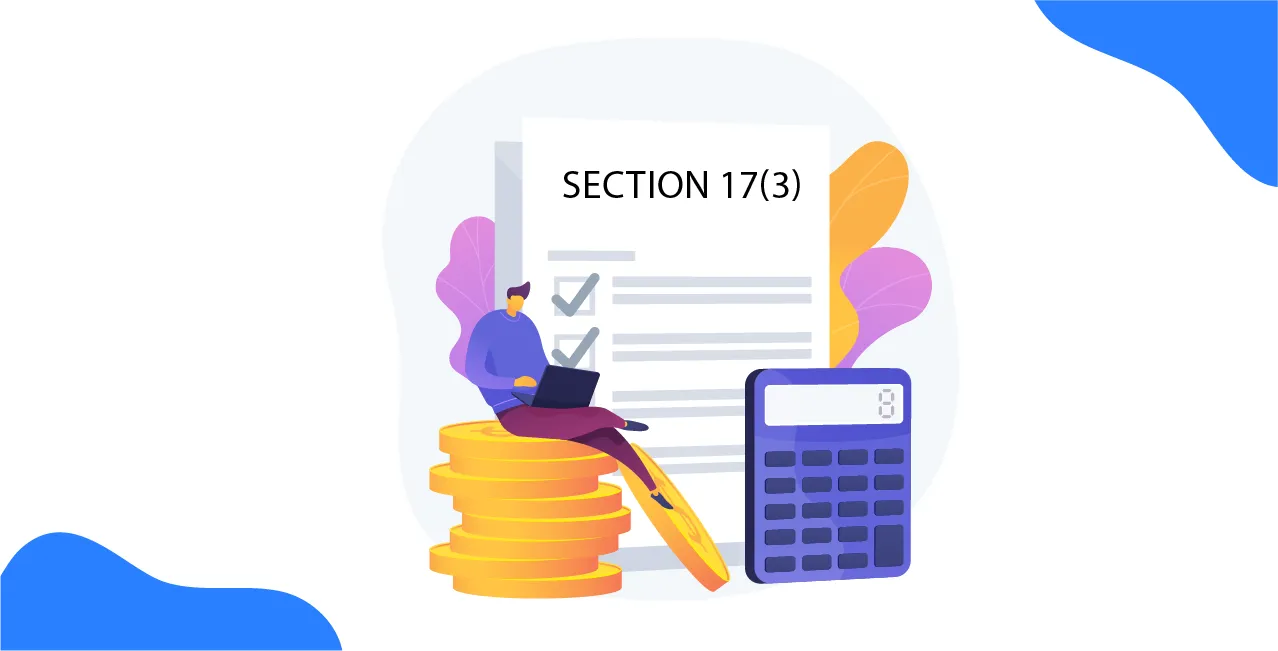Section 17(3) of Income Tax Act: Salary Components Explained

Check Your Loan Eligibility Now
By continuing, you agree to LoansJagat's Credit Report Terms of Use, Terms and Conditions, Privacy Policy, and authorize contact via Call, SMS, Email, or WhatsApp
Section 17(3) of the Income Tax Act defines "profits in lieu of salary." It includes any amount received by an employee apart from the regular salary, such as bonuses, incentives, or compensation.
For example, Meera works in a private firm and earns a monthly salary of ₹40,000. At the end of the year, she receives a performance bonus of ₹60,000. This bonus is considered a profit in lieu of salary and is taxable under the head “income from salaries.”
All such payments, whether in cash or in kind, form part of the employee’s income and are taxed accordingly. Section 17(3) ensures that any additional earnings linked to employment are not left out of the tax scope.
Importance of Section 17(3) of Income Tax Act
Section 17(3) of the Income Tax Act plays an important role in defining and taxing benefits received by an employee beyond their basic salary. These benefits are called “profits instead of salary” and ensure that all income linked to employment is brought under taxation.
- It includes payments like bonuses, compensation for loss of job, and other cash benefits given by the employer.
- It also covers medical treatment expenses and travel abroad for treatment, including travel of one attendant, but only under certain conditions.
- The tax exemption on medical and travel costs applies only if the Reserve Bank of India permits it and if the employee’s gross income does not exceed ₹2,00,000.
- From the assessment year 2002–03, the exemption clause will not apply if an employee’s salary (excluding monetary perquisites) is not more than ₹1,00,000.
- It ensures fairness by taxing all non-salary income related to a job while offering relief in genuine medical cases under strict rules.
For example, after being laid off, Ravi receives ₹4,00,000 as a basic salary and ₹1,50,000 as job loss compensation.
Here, the ₹1,50,000 received as compensation is taxed under Section 17(3) as “profit instead of salary,” making his total taxable income ₹5,50,000. This shows how Section 17(3) ensures that all income linked to employment is reported and taxed properly.
Objectives of Section 17(3) of the Income Tax Act
Let’s say Anita worked for a company for 10 years. When she resigned, her employer gave her:
- ₹6,00,000 as a retirement bonus,
- ₹1,20,000 as a signing bonus for a new role earlier that year, and
- Paid ₹50,000 directly to a hospital for her treatment.
Although these are not part of her monthly salary, they are linked to her job and are covered under Section 17(3). So, the total amount of ₹7,70,000 is treated as “profits in lieu of salary” and becomes taxable income.
TDS Rate Under Section 17(3) of the Income Tax Act
Employers must deduct Tax Deducted at Source (TDS) on any payment made to an employee that falls under “profits in lieu of salary”. These include termination benefits, bonuses, and voluntary payments. The TDS is deducted under Section 192 of the Income Tax Act, just like regular salary.
Example:
Ravi receives the following from his employer in one financial year:
- Basic Salary: ₹6,00,000
- Bonus: ₹50,000 (profits in lieu of salary)
- Severance Pay: ₹1,00,000 (profits in lieu of salary)
Total Taxable Income = ₹6,00,000 + ₹50,000 + ₹1,00,000 = ₹7,50,000
TDS will be deducted as per the applicable income tax slabs on the total income of ₹7,50,000.
Exemption Under Section 17(3) of the Income Tax Act
Section 17(3) of the Income Tax Act mainly deals with taxable payments made in place of salary. However, certain exemptions are available for specific types of payments if they meet the required conditions.
Employers can offer benefits such as leave travel allowance, medical treatment allowance, or reimbursement of expenses. These payments may be exempt from tax, but only if they follow the limits and rules set by the Act.
For example, medical expenses for treatment abroad, including travel and stay of one attendant, can be exempt. However, this applies only if:
- The Reserve Bank of India permits the expenses.
- The employee’s gross income before including such expenses is not more than ₹2,00,000.
These exemptions aim to support genuine needs while ensuring fair tax treatment. Employers and employees must maintain proper proof and follow rules strictly to claim these exemptions.
Due Date and Compliance Requirements Under Section 17(3) of the Income Tax Act
Practical Examples
Rohan worked at a software company for five years. Due to company restructuring, his employment was terminated. The company paid him ₹1,50,000 as severance pay, ₹40,000 as a signing bonus for rejoining another group company, and ₹60,000 in voluntary payments not included in his basic salary. These payments are treated as profits in lieu of salary under Section 17(3) and are fully taxable under the head “Income from Salaries”.
- Profits in lieu of salary include termination benefits, signing bonuses, and voluntary payments.
- These amounts are taxed as part of the salary under Section 192 (TDS).
- No special exemption applies unless specified under separate provisions.
- Employers must deduct TDS based on the employee’s total income.
This example shows how extra payments received during or after employment are not tax-free and must be reported and taxed just like regular salary.
Conclusion
Section 17(3) of the Income Tax Act ensures that any payment made by an employer in place of salary is taxed fairly. It includes bonuses, termination benefits, voluntary payments, and similar income. These amounts form part of the employee’s salary and are fully taxable. This section helps maintain transparency and prevents misuse of non-salary payments to avoid tax. Employees must report such income properly, and employers must deduct TDS as per the law.
FAQ’s
1. What is Section 17(3) of the Income Tax Act?
Section 17(3) covers payments received by an employee in place of salary, like bonuses, termination pay, and voluntary payments. These are fully taxable.
2. Are severance payments taxable under Section 17(3)?
Yes, severance or compensation for job loss is treated as profits in lieu of salary and is taxable.
3. Is TDS deducted on payments under Section 17(3)?
Yes, employers must deduct TDS on such payments as per the applicable income tax slab of the employee.
4. Are medical expenses paid by the employer taxable?
Some medical expenses may be exempt if the RBI permits them and the employee's income is below the set limit.
5. Do I need to declare such payments in my ITR?
Yes, you must declare all payments received under Section 17(3) as part of your salary income in your return.
Other Related Pages | |||
About the author

LoansJagat Team
Contributor‘Simplify Finance for Everyone.’ This is the common goal of our team, as we try to explain any topic with relatable examples. From personal to business finance, managing EMIs to becoming debt-free, we do extensive research on each and every parameter, so you don’t have to. Scroll up and have a look at what 15+ years of experience in the BFSI sector looks like.
Subscribe Now
Related Blog Post
Recent Blogs
All Topics
Contents
Quick Apply Loan
Consolidate your debts into one easy EMI.
Takes less than 2 minutes. No paperwork.
10 Lakhs+
Trusted Customers
2000 Cr+
Loans Disbursed
4.7/5
Google Reviews
20+
Banks & NBFCs Offers
Other services mentioned in this article








